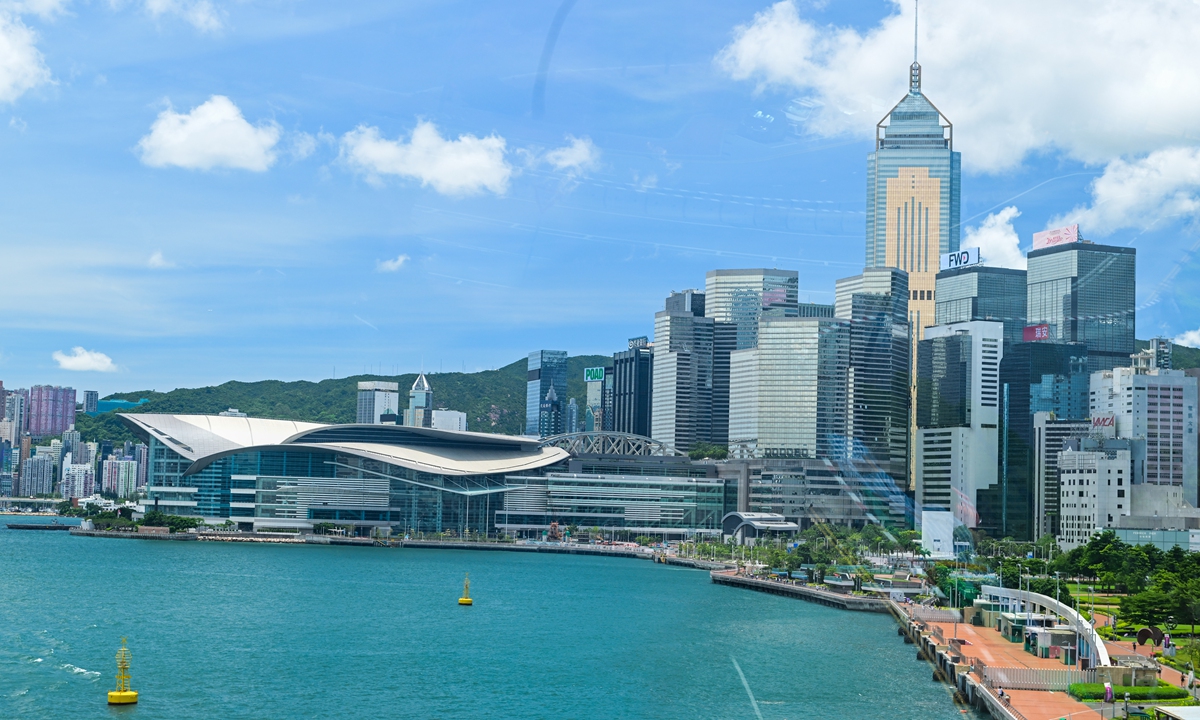
A view of Victoria Harbor, Hong Kong Photo: VCG
Global investors eye Hong Kong as a robust and reliable safe haven, noting the city’s strength in stock markets, wealth management and insurance, Hong Kong Financial Secretary Paul Chan Mo-po wrote in a blog post on Sunday.
Chan’s remarks came as the incumbent Hong Kong Special Administrative Region government is approaching three years in office.
In face of an uncertain global political and economic environment, Hong Kong’s status as a free port has remained stable, and its legal system is well-established, making it a robust and reliable safe haven for international investors, Chan wrote in his blog post.
Hong Kong’s status as an international financial center has been consolidated and enhanced and the stock market has regained an upward trajectory over the past year, with significant increases in trading volume, Chan said.
The average daily turnover of the Hong Kong stock exchange has risen to more than HK$240 billion ($30.57 billion) in 2025, while the amount of funds raised through IPOs ranks first globally at the moment, he said.
Alongside the increase in volume, the quality of Hong Kong stocks has also improved. Since reforms were implemented in 2018, the number of newly listed companies in the new economy and biotechnology sectors has risen to approximately 370, accounting for about 14 percent of the total number of listed companies, with a market capitalization share exceeding 27 percent and a trading volume share of more than 30 percent, said the Hong Kong official.
The development of the financial center is also reflected in different sectors, according to Chan.
In wealth management, for instance, the number of registered funds reached 976 by the end of March, with a net inflow of more than $44 billion compared with the same point last year, representing annual growth of 285 percent.
“It is expected that within the next two to three years, Hong Kong will become the world’s leading cross-border asset management center,” Chan said.
In insurance, the number of new long-term insurance policies issued in 2024 reached 1.08 million, with premiums close to HK$220 billion. Compared with 2022, the number of insurance policies shot up by 40 percent while the value of premiums surged by 70 percent.
As of April, total bank deposits in Hong Kong exceeded HK$18 trillion, up approximately 19 percent compared with the end of June 2022, said Chan.
Hong Kong saw its rankings rise in the recently released the 2025 IMD World Competitiveness Yearbook by the International Institute for Management Development in Lausanne, Switzerland.
The yearbook said that Hong Kong advanced to the third position in the global competitiveness rankings. This is the first time that Hong Kong returned to the top three since 2019.
When asked to comment, Chinese Foreign Ministry spokesperson Guo Jiakun said on Thursday that Hong Kong is becoming more attractive as an international financial center, and it is drawing more foreign companies and individuals to make investments and start new businesses.
Noting the Hong Kong national security law will soon enter its fifth year of implementation, Guo said China believes that with the institutional safeguards of “One Country, Two Systems,” and given Hong Kong’s unique advantage of having the backing of the motherland and being connected to the world as well as offering a secure environment for high-quality development, Hong Kong is headed to an even brighter future.
Ong Tee Keat, president of the Malaysia-based Belt and Road Initiative Caucus for Asia-Pacific, told the Global Times on Sunday that five years into the implementation of the Hong Kong national security law, there has been a restoration of social order, stability and confidence, and the IMD ranking stands as a convincing reply to the doomsayers’ critiques.






